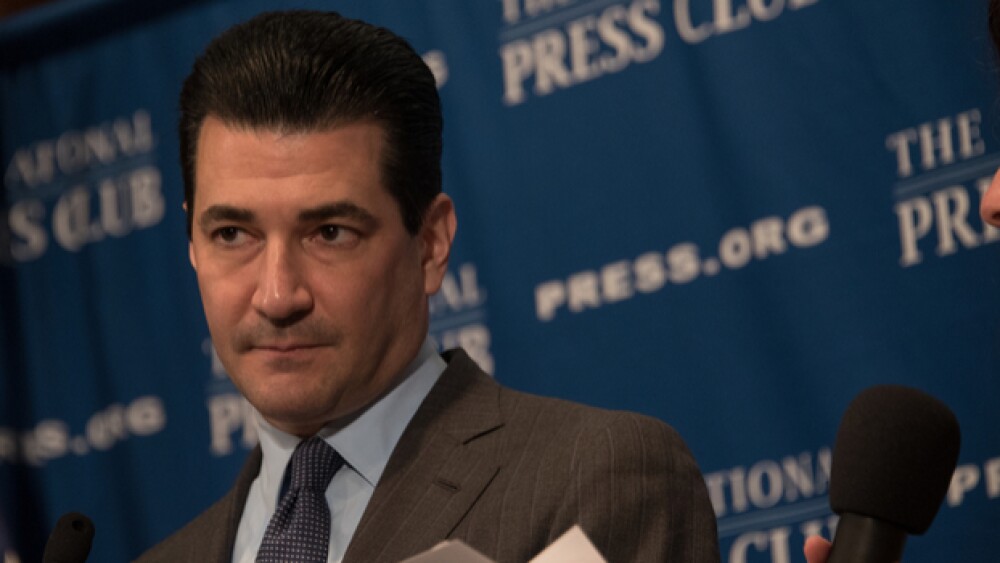With the clock winding down on his tenure at the U.S. Food and Drug Administration, Commissioner Scott Gottlieb continues to take aim at a number of concerns he has raised over the past two years, including the dangers of vaping and unsanctioned use of stem cells.
Albert H. Teich / Shutterstock.com
With the clock winding down on his tenure at the U.S. Food and Drug Administration (FDA), Commissioner Scott Gottlieb continues to take aim at a number of concerns he has raised over the past two years, including the dangers of vaping and unsanctioned use of stem cells.
Over the past several weeks, the FDA targeted a Florida company over its use of unapproved stem cells-based treatments and also issued an additional 20 other letters of warning to other providers of these unsanctioned treatments. The companies claim to be using human umbilical cord blood cells that are allegedly processed as a treatment for a number of different issues, including osteoarthritis or orthopedic conditions. The Florida-based company, Cord for Life offered such treatments. In a letter dated March 29, the FDA said the company claims to use the umbilical cord cells as regenerative products, which makes them subject to regulation as a drug under federal law. The letter further said that Cord for Life’s products are not regulated and have not gone through clinical studies. In order to remain in compliance with the law, the FDA said Cord for Life must go through a rigorous clinical study and then have a Biologics License Application approved before their stem cell treatments could be commercialized.
In a statement issued Wednesday, Gottlieb said that birthing-related stem cells, unlike those from bone marrow, “have not yet been shown to be safe and effective for use in the treatment of any other diseases or conditions.” Gottlieb said the FDA has seen too many companies make claims that stem cell treatments offered to their clients are not subject to FDA regulation because the cells were taken from the same patient and then allegedly re-engineered for another use for that same person. Gottlieb also said there have been too many cases of “companies making unsubstantiated claims that these treatments prevent, treat, cure or mitigate disease where the products have sometimes led to serious patient harm.” In December, the FDA and Centers for Disease Control investigated the cases surrounding 12 people who were hospitalized due to bacterial infections caused by stem cell products.
Also last fall, the federal government cracked down on clinics making claims that certain stem cell therapies can treat a number of serious diseases such as Parkinson’s disease, autism, macular degeneration, cerebral palsy, multiple sclerosis, and heart attacks.
“We remain very concerned that countless clinics across the country continue to market violative stem cell products to patients, claiming that they don’t fall under the regulatory provisions for drugs and biologics. This is simply not true. The FDA has had final regulations in place for these products for well over a decade. We intend to take steps to help make sure that products are produced and marketed in compliance with statutes and our regulations,” Gottlieb said in the statement. “We’ll continue to conduct inspections, as appropriate, to help ensure such compliance. And we will not shy away from taking further steps when we see bad actors taking advantage of patients, and putting them at serious risk, for their own financial profit.”
In 2017, the FDA announced a new guidance for products made from human cells and tissues. Gottlieb said the FDA is halfway through the period where the agency intends to “exercise enforcement discretion for certain regenerative medicine products with respect to the FDA’s investigational new drug application (IND) and premarket approval requirements when the use of the product does not raise reported safety concerns or potential significant safety concerns.”
Also on Wednesday, the FDA announced new compounding priorities for the next year. The FDA said it will use the priorities and work with stakeholders in order to improve the quality of compounded drugs. In a statement, the FDA said that most compounders work hard to remain in compliance with regulations, but some are not. The FDA said a key component of work this year regarding compounders will be performing risk-based inspection to “identify compounders who produce drugs under substandard conditions or use inappropriate practices that could lead to serious harm.”
Additionally, Gottlieb said the FDA will continue to develop guidelines “to develop a modern regulatory framework to make sure that safe and effective artificial intelligence devices can efficiently advance to patients.”





